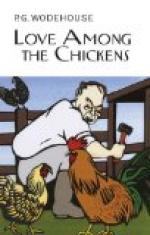In the fourth and fifth games I omitted to score. Phyllis had left the cedar now, and was picking flowers from the beds behind the court.
We began the sixth game. And now for some reason I played really well. I struck a little vein of brilliance. I was serving, and this time a proportion of my serves went over the net instead of trying to get through. The score went from fifteen all to forty-fifteen. Hope began to surge through my veins. If I could keep this up, I might win yet.
The Tilden Slosh diminished my lead by fifteen. Then I got in a really fine serve, which beat him. ’Vantage In. Another Slosh. Deuce. Another Slam. ’Vantage out. It was an awesome moment. There is a tide in the affairs of men, which, taken by the flood—I served. Fault. I served again,—a beauty. He returned it like a flash into the corner of the court. With a supreme effort I got to it. We rallied. I was playing like a professor. Then whizz—!
The Slosh had beaten me on the post.
“Game and—,” said Mr. Chase, tossing his racquet into the air and catching it by the handle. “Good game that last one.”
I turned to see what Phyllis thought of it.
At the eleventh hour I had shown her of what stuff I was made.
She had disappeared.
“Looking for Miss Derrick?” said Chase, jumping the net, and joining me in my court, “she’s gone into the house.”
“When did she go?”
“At the end of the fifth game,” said Chase.
“Gone to dress for dinner, I suppose,” he continued. “It must be getting late. I think I ought to be going, too, if you don’t mind. The professor gets a little restive if I keep him waiting for his daily bread. Great Scott, that watch can’t be right! What do you make of it? Yes, so do I. I really think I must run. You won’t mind. Good-night, then. See you to-morrow, I hope.”
I walked slowly out across the fields. That same star, in which I had confided on a former occasion, was at its post. It looked placid and cheerful. It never got beaten by six games to love under the very eyes of a lady-star. It was never cut out ignominiously by infernally capable lieutenants in His Majesty’s Navy. No wonder it was cheerful.
CHAPTER XIV
A COUNCIL OF WAR
“The fact is,” said Ukridge, “if things go on as they are now, my lad, we shall be in the cart. This business wants bucking up. We don’t seem to be making headway. Why it is, I don’t know, but we are not making headway. Of course, what we want is time. If only these scoundrels of tradesmen would leave us alone for a spell we could get things going properly. But we’re hampered and rattled and worried all the time. Aren’t we, Millie?”
“Yes, dear.”
“You don’t let me see the financial side of the thing enough,” I complained. “Why don’t you keep me thoroughly posted? I didn’t know we were in such a bad way. The fowls look fit enough, and Edwin hasn’t had one for a week.”




